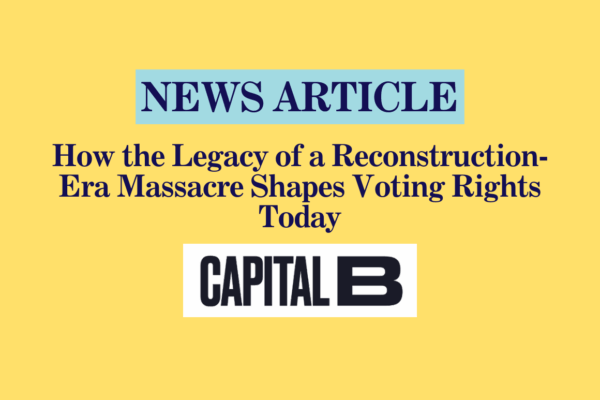BY BRANDON TENSLEY
Shauna Sias, 48, has lived in Opelousas, Louisiana, almost her entire life. And thanks to her father, a civil rights advocate who battled racial segregation in the Deep South, she’s always known about the massacre that shattered the small Louisiana city during Reconstruction.
Over the course of around two weeks beginning on Sept. 28, 1868, white men in Opelousas murdered as many as 250 people, most of them Black Americans. The vigilantes’ goal was to suppress Black voter turnout ahead of the November presidential election.
The Opelousas Massacre was one of the deadliest episodes of racist violence during the country’s second founding, and its deeper aim — to limit Black voting strength — mirrors political conflicts plaguing Louisiana more than 150 years later.
“It feels like we’re in the same fight today,” Sias, an organizer, told Capital B. “We aren’t getting massacred the way we were in 1868, but we’re still getting massacred — we’re still fighting for the same equality. It’s just a different century.”
Consider Louisiana’s years-long redistricting clash.
In January, Republican Gov. Jeff Landry signed into law a congressional map that gives the state a second majority-Black district. Previously, Black residents could elect their preferred candidate in only one district, even though Louisiana is 33% Black. Days after the new map was enacted, a group of white voters filed a lawsuit challenging it. They hope to bring back the lines that diminished the influence of their Black fellow Americans.
“Nothing, really, has changed,” Sharlene Sinegal-DeCuir, a history professor at Xavier University of Louisiana, explained to Capital B, reflecting on the loud echoes between the past and our present. “I don’t think that this history has gone away — at all. Black people here continue to struggle to have their voices heard.”
Of course, disputes over maps stretch beyond Louisiana. For instance, the U.S. Supreme Court will soon decide whether it’s OK for South Carolina Republicans to use a racially discriminatory congressional map if the lines are drawn to secure a partisan objective. And the high court has ordered the 2024 elections in Galveston County, Texas, to be conducted under a map that had been deemed “mean-spirited” because it carves the diverse county into all majority-white districts.
Yet Louisiana feels especially noteworthy. It was one of the most progressive states during Reconstruction: Its 1868 constitutional convention extended the franchise to Black men, and other provisions demanded the integration of public schools. Today, however, Louisiana is associated with rigid conservatism, and it ranks near the very bottom on the issue of fair representation.
THE TRAILBLAZER LEADING THE "NEW SOUTHERN STRATEGY"
New Orleans resident Alanah Odoms isn’t only informed by history — the 42-year-old herself has made history as the first Black woman to lead the ACLU of Louisiana, which was established in 1956.
Odoms said that she and her colleagues connect their present-day civil rights work — including their efforts to rein in the menace of racist policing and protect the sanctity of the ballot box — to the past so that people can understand the evolution of systemic oppression.
Call it the New Southern Strategy. It’s something like an inversion of the Republican Party’s plot in the latter half of the 20th century to grow its political power among white voters below the Mason-Dixon line by stoking their resentment of civil rights gains.
“I like to think of the work we and others do as the New Southern Strategy, making sure that voting rights are protected in the Deep South,” she told Capital B. “What we’ve seen over the past decade is the repeal of pieces of the Voting Rights Act, and this white supremacist force become stronger and stronger.”
Through 2013’s Shelby County v. Holder, the U.S. Supreme Court defanged Section 5 of the Voting Rights Act, which had mandated that states with histories of racial discrimination receive federal approval before changing their voting policies. Without this backstop, individual citizens and civil rights groups have had to increasingly depend on Section 2 to challenge racial discrimination in voting.
This use of the provision is poised for a Supreme Court showdown, where several Republican-nominated justices seem eager to gut it.
Despite this bleak outlook, Odoms is energized by the fact that Louisiana’s recent redistricting victory — her organization represented plaintiffs in the case — offers a chance for the American South to reject the white power structure.
She’s lived in New Orleans for 16 years, and one thing she’s learned during this time is that numbers are crucial. The state has had only five Black people represent it in Congress since Reconstruction, and stronger Black representation can bring vulnerable communities greater access to key resources, including roads, schools, and hospitals.
“We often talk about policy issues in terms of narrative stories, which are very important. But, really, we’re talking about the number of seats in the House and the Senate. We’re talking about numbers,” said Odoms. “We have an opportunity to talk about not only the narrative of equality — but also the importance of a system that produces numbers that actually serve the people.”

